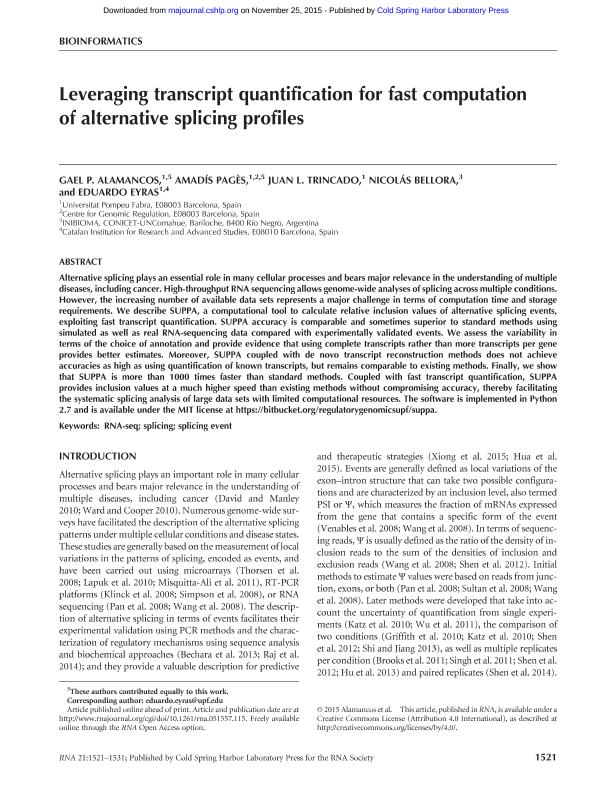Mostrar el registro sencillo del ítem
dc.contributor.author
Alamancos, Gael P.
dc.contributor.author
Pages, Amadis
dc.contributor.author
Trincado, Jose Luis
dc.contributor.author
Bellora, Nicolás

dc.contributor.author
Eyras, Eduardo
dc.date.available
2017-01-19T19:18:40Z
dc.date.issued
2015-07
dc.identifier.citation
Alamancos, Gael P.; Pages, Amadis; Trincado, Jose Luis; Bellora, Nicolás; Eyras, Eduardo; Leveraging transcript quantification for fast computation of alternative splicing profiles; Cold Spring Harbor Lab Press; Rna (new York, N.y.); 21; 9; 7-2015; 1521-1531
dc.identifier.issn
1355-8382
dc.identifier.uri
http://hdl.handle.net/11336/11645
dc.description.abstract
Alternative splicing plays an essential role in many cellular processes and bears major relevance in the understanding of multiple diseases, including cancer. High-throughput RNA sequencing allows genome-wide analyses of splicing across multiple conditions. However, the increasing number of available data sets represents a major challenge in terms of computation time and storage requirements. We describe SUPPA, a computational tool to calculate relative inclusion values of alternative splicing events, exploiting fast transcript quantification. SUPPA accuracy is comparable and sometimes superior to standard methods using simulated as well as real RNA-sequencing data compared with experimentally validated events. We assess the variability in terms of the choice of annotation and provide evidence that using complete transcripts rather than more transcripts per gene provides better estimates. Moreover, SUPPA coupled with de novo transcript reconstruction methods does not achieve accuracies as high as using quantification of known transcripts, but remains comparable to existing methods. Finally, we show that SUPPA is more than 1000 times faster than standard methods. Coupled with fast transcript quantification, SUPPA provides inclusion values at a much higher speed than existing methods without compromising accuracy, thereby facilitating the systematic splicing analysis of large data sets with limited computational resources. The software is implemented in Python 2.7 and is available under the MIT license at https://bitbucket.org/regulatorygenomicsupf/suppa.
dc.format
application/pdf
dc.language.iso
eng
dc.publisher
Cold Spring Harbor Lab Press

dc.rights
info:eu-repo/semantics/openAccess
dc.rights.uri
https://creativecommons.org/licenses/by/2.5/ar/
dc.subject
Bioinformatics
dc.subject
Rna-Seq
dc.subject
Splicing
dc.subject
Cancer
dc.subject.classification
Biología

dc.subject.classification
Ciencias Biológicas

dc.subject.classification
CIENCIAS NATURALES Y EXACTAS

dc.title
Leveraging transcript quantification for fast computation of alternative splicing profiles
dc.type
info:eu-repo/semantics/article
dc.type
info:ar-repo/semantics/artículo
dc.type
info:eu-repo/semantics/publishedVersion
dc.date.updated
2016-12-12T14:23:20Z
dc.journal.volume
21
dc.journal.number
9
dc.journal.pagination
1521-1531
dc.journal.pais
Estados Unidos

dc.journal.ciudad
Nueva York
dc.description.fil
Fil: Alamancos, Gael P.. Universitat Pompeu Fabra; España
dc.description.fil
Fil: Pages, Amadis. Universitat Pompeu Fabra; España. Centre for Genomic Regulation; España
dc.description.fil
Fil: Trincado, Jose Luis. Universitat Pompeu Fabra; España
dc.description.fil
Fil: Bellora, Nicolás. Consejo Nacional de Investigaciones Científicas y Técnicas. Centro Científico Tecnológico Patagonia Norte. Instituto de Investigación En Biodiversidad y Medioambiente; Argentina
dc.description.fil
Fil: Eyras, Eduardo. Institució Catalana de Recerca I Estudis Avancats; España. Universitat Pompeu Fabra; España
dc.journal.title
Rna (new York, N.y.)

dc.relation.alternativeid
info:eu-repo/semantics/altIdentifier/url/http://rnajournal.cshlp.org/content/21/9/1521.long
dc.relation.alternativeid
info:eu-repo/semantics/altIdentifier/doi/http://dx.doi.org/10.1261/rna.051557.115
dc.relation.alternativeid
info:eu-repo/semantics/altIdentifier/url/https://www.ncbi.nlm.nih.gov/pmc/articles/PMC4536314/
Archivos asociados
